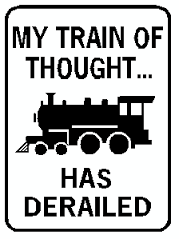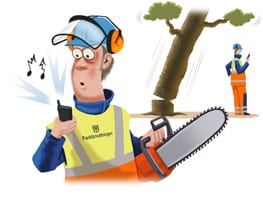
Like many of you, I do my best work when I am not interrupted. Whether it’s someone trying to carry on a conversation, a phone ringing or a text message, an interruption disrupts the train of thought. And when the train of thought is disrupted, situational awareness can be adversely impacted.
The sketchpad in your mind
For those who’ve attended the Mental Management of Emergencies or the Flawed Situational Awareness program, you will be very familiar with the mental sketchpad and the role it plays in forming and maintaining situational awareness. For those who’ve not had the opportunity to attend a program yet, let me provide a short explanation…
When your senses gather information (sometimes termed clues and cues), the information serves as proverbial puzzle pieces that, when combined, form situational awareness. It is on the mental sketchpad that the puzzle pieces are put together. While this sounds like a simple process there are many things that can go awry when it comes to capturing, piecing together, and understanding these puzzle pieces.
The sketch pad is also the location where mental predictions of future events occur. Thus, this is a very busy place and the sketch pad has to pick and choose what it allows on to the pad.
Shifting attention
 When you have something on your mind, whatever that may be, that thought is occupying your sketchpad. Stated another way, you are giving your conscious attention to whatever is on your mind. What happens when you shift attention to something else? There are a couple of possible outcomes. First, your current thought may go into a temporary memory buffer (i.e., get pushed off to the corner of your sketchpad). Or, the current thought may be completely lost (i.e., gets pushed completely off the sketchpad).
When you have something on your mind, whatever that may be, that thought is occupying your sketchpad. Stated another way, you are giving your conscious attention to whatever is on your mind. What happens when you shift attention to something else? There are a couple of possible outcomes. First, your current thought may go into a temporary memory buffer (i.e., get pushed off to the corner of your sketchpad). Or, the current thought may be completely lost (i.e., gets pushed completely off the sketchpad).
Unfortunately, you have little direct control over what gets set aside or gets pushed off. And there are many factors that influence what will happen, including the presence of residual visual or audible clues that will bring you back on task quickly, stress associated with the former task, your emotional attachment to the former task and your familiarity with the former task just to name a few.
Likewise, the strength of the visual or audible clues, stress, emotions and familiarity with the new task may impact your ability to shift attention back to the previous task.
The Interruption

Interruptions can be expected or unexpected. If expected, you’ve likely already prepared yourself mentally for the event. In anticipation, you may make a note about what you are working on so that when the interruption is done, you can quickly and easily get back on task. If unexpected, the clues and cues of the interruption come flooding on to your mental sketchpad with reckless abandon, caring not what they trod over, push aside or even push off the pad.
Controlling the interruption
If you are able to anticipate an interruption, it is much easier to control it’s potential situational awareness devastation by making a note of where your thoughts were and what you were doing at the moment the interruption occurred. You may also be able to control the interruption by consciously choosing not to allow your attention to shift from the current task at hand.
For example, when your phone rings, you have a choice to make about whether or not to answer it. I am continually amazed at how often I witness someone answering the phone while deep in the middle of some heavy mental lifting, only to tell the caller that it’s not a good time to talk. If it’s not a good time to talk, the receiver of the call could have chosen to simply not answer the call and let it go to voice mail. This would allow the receiver of the call to control the interruption by playing the message back, and returning the call, at a more convenient time.
Humans are social creatures and there is a certain desire or expectation that we be polite and accommodating when approached by another person wanting to address us. Depending on the task you are engaged in, stopping what you are doing to accommodate someone else may have little impact. However, if the task is critical to a mission or safety, the interruption could have a catastrophic impact.
Dr. Gasaway’s Advice
 There are numerous documented examples of tragedies that occurred because someone who was engaged in a critical task was interrupted. The shift in attention caused a higher priority task to be pushed aside or forgotten completely. It can happen so easily.
There are numerous documented examples of tragedies that occurred because someone who was engaged in a critical task was interrupted. The shift in attention caused a higher priority task to be pushed aside or forgotten completely. It can happen so easily.
Most of us think we are much better at managing our short-term memory buffer than we really are. When you are under stress, the ability to manage the shifting of attention to multiple tasks can become especially challenging. This is how some people who may believe they are pretty good at multitasking (under non-stressed conditions) get themselves into a tight jam when they try to shift attention among multiple competing inputs under stress. The outcomes are often predictable.
The best practice for interruptions is to ensure you have a means by which to put a placeholder on where you left off and to control what you choose to let highjack control of your sketchpad. There’s nothing wrong with telling a person who comes up to say something to you: “Can you hold on for just a second while I complete this thought.” Or, “Give me just a moment to write something down.” Or, “Could we schedule a time to talk about this?”
Obviously, this method of buying yourself time isn’t going to work in a dynamically changing environment full of stress and consequence (like an emergency scene). In this case, make a mental (or written) note of where you left off. Or, if possible, use the services of a second person to serve as a scribe (your note taker) or to run interference (e.g., handle the radio traffic for you, or answer the phone for you, or talk face-to-face for you with the person who has information they feel you need to know).
 Action items
Action items
- Discuss a time when your thought process was interrupted and led to an adverse consequence.
- Discuss a time when you approached someone and interrupted their thought process and it had an adverse consequence.
- Discuss strategies for how you could manage interruptions while working in environments that are high-stress, high consequence with dynamically changing conditions.
_____________________________________________________

If you are interested in taking your understanding of situational awareness and high-risk decision making to a higher level, check out the Situational Awareness Matters Online Academy.
CLICK HERE for details, enrollment options and pricing.
__________________________________
Share your comments on this article in the “Leave a Reply” box below. If you want to send me incident pictures, videos or have an idea you’d like me to research and write about, contact me. I really enjoy getting feedback and supportive messages from fellow first responders. It gives me the energy to work harder for you.
Thanks,

Email: Support@RichGasaway.com
Phone: 612-548-4424
SAMatters Online Academy
Facebook Fan Page: www.facebook.com/SAMatters
Twitter: @SAMatters
LinkedIn: Rich Gasaway
YouTube: SAMattersTV
iTunes: SAMatters Radio

Great message, Rich! It is so true! I have just begun teaching position specific ICS Safety Officer and would like to use some of these ideas in class.
Cheers